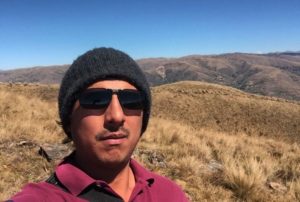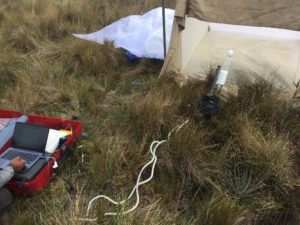a. What is your background? Where are you from? What do you study? What are you most interested in, scientifically?
 My Name is Jhonatan, I was born in the beautiful city of Cusco-Peru, I did my bachelor’s degree in biology and I am currently a graduate of the master’s degree in ecology and environmental management, in recent years I have been working on the ecology and dynamics of cloud forests and lately in the functional ecology of the high Andean grasslands in the Manu National Park, I think that by understanding the functioning and status of these unique ecosystems with great ecological value, it can be conserved in a more efficient way through functional ecology, which is of my scientific interest.
My Name is Jhonatan, I was born in the beautiful city of Cusco-Peru, I did my bachelor’s degree in biology and I am currently a graduate of the master’s degree in ecology and environmental management, in recent years I have been working on the ecology and dynamics of cloud forests and lately in the functional ecology of the high Andean grasslands in the Manu National Park, I think that by understanding the functioning and status of these unique ecosystems with great ecological value, it can be conserved in a more efficient way through functional ecology, which is of my scientific interest.
b. Give us a brief summary of your internship project. What is the study system? Primary research questions? With whom are you working?
My project is about CO2 flux in the humid puna of the tropical Andes, in addition, to how functional traits influence these fluxes, so as part of my research is to have the mediation data of the plant community traits that comprise this ecosystem, my role in this internship is to carry out part of the Traits Wheel, which consists of weighing and counting the leaves of the plants collected in the field, as well as reviewing and passing data to a general database as well as the documentation.
c. What is your role in the research team in terms of tasks and responsibilities, and how do these relate to the aims of the research project?
Throughout 2019 we have been collecting data on plant traits from the humid puna of Manu National Park, as well as data on CO2 fluxes in burned areas and in undisturbed areas, which it was my responsibility this last aspect. In the year 2020, I also had the responsibility of continuing to collect data on carbon fluxes as well as traits from the plant community of the puna, and for this internship, I had the responsibility of weighing and passing data on traits this is, of course, a part essential for the purpose of how the functional traits of plants influence the CO2 flux in these ecosystems, in addition to that to have a very good data quality it is necessary to be very focused and patient.
 d. What were your specific goals for the upcoming internship? These can be both scientific and personal. Are you meeting, or did you (if the internship is complete) accomplish your goals? Please explain with specific examples if possible.
d. What were your specific goals for the upcoming internship? These can be both scientific and personal. Are you meeting, or did you (if the internship is complete) accomplish your goals? Please explain with specific examples if possible.
Contributing to the data processing for the research team as well as improving and obtaining more skills in the Traits Wheel is something that I achieved, as well as understanding more how a research work can be carried out and approached.
e. What skills or knowledge from your prior experience and education did you find useful during this internship? Did you develop any new skills or knowledge? Please explain.
In general, thanks to all the functional traits project, I have learned to use and measure CO2 fluxes, using the LI-COR 7500 as well as the LI-COR 840A, in addition to the design of experiments, however, I still did not have much practice on the Traits Wheel, which was something I learned in this internship, which I consider a very important part of having high-quality data.
f. How has the COVID19 pandemic altered your plans or your experience during this internship?
The current situation due to COVID-19 changed many of my personal plans, although the majority was to postpone field activities, meetings, trips, etc. I think the positive part is that I could get this internship and be able to continue working from the comfort of my home, as well as continue advancing my research project, further to contribute to the development of the objectives of the internship, also my experience of thinking or be analytical with the future, in addition to being able to participate in many seminars, online readings, (which was difficult before, so I think I took the advantage of the quarantine). Thank you, for this opportunity!!!